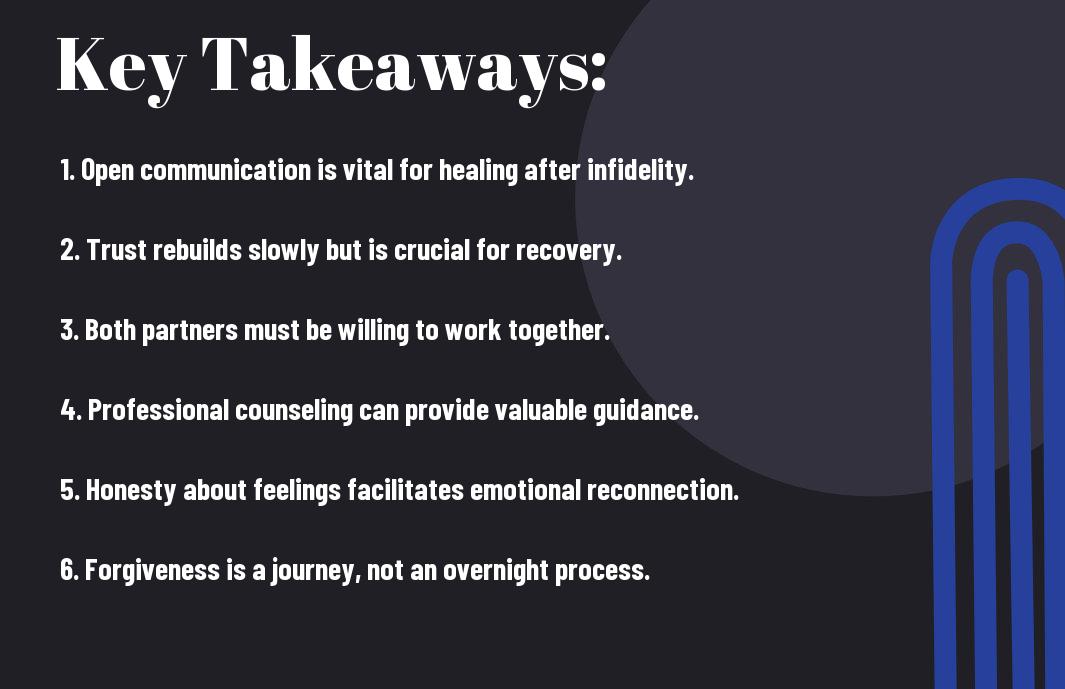Many individuals grapple with the aftermath of infidelity, questioning whether it’s truly possible to rebuild trust and restore your relationship. The journey to recovery can be both challenging and enlightening, as it demands understanding, forgiveness, and commitment from both partners. Facing painful truths and effective communication play vital roles in navigating this turbulent emotional landscape. While the road may be long and fraught with obstacles, cultivating a deeper connection through mutual effort can lead to a healthier, more resilient bond. In this blog post, you will explore the dynamics of recovery and strategies that can help you heal.
Key Takeaways:
- Infidelity can be a deeply painful experience, but recovery is possible through open communication and understanding between partners.
- Both partners need to acknowledge the impact of the betrayal and express their feelings honestly to begin the healing process.
- Establishing clear boundaries and rebuilding trust are crucial steps in overcoming the aftermath of infidelity.
- Seeking professional help, such as couples therapy or individual counseling, can provide valuable support and guidance.
- Time is an important factor in healing, and both partners should be patient with one another as they work through their emotions.
- Engaging in honest discussions about expectations, needs, and fears can help prevent future issues and strengthen the relationship.
- Ultimately, successful recovery from infidelity often leads to a deeper understanding and stronger bond between partners if both are committed to the process.

Understanding Infidelity
To comprehend infidelity, it’s crucial to explore its layers and motivations. Infidelity often stems from unmet needs, emotional disconnection, or the thrill of secrecy. Understanding the reasons behind it can provide both partners clarity, enabling them to address the underlying issues in their relationship. Recognizing these factors is the first step towards healing.
Types of Infidelity
Types of infidelity can vary widely and encompass different forms of betrayal. The following table outlines some common types:
| Emotional Infidelity | Involves forming a deep emotional connection with someone outside the relationship. |
| Physical Infidelity | Consists of sexual acts with someone other than your partner. |
| Cyber Infidelity | Engaging in romantic or sexual chats online. |
| One-Night Stands | Brief encounters driven by desire without emotional attachment. |
| Avoidant Infidelity | Engaging in affairs to escape relationship issues. |
Any type of infidelity can lead to severe emotional turmoil for both partners, yet realizing what form it takes helps in surviving the aftermath.
Psychological Impact on Partners
With infidelity comes a profound psychological impact on both partners involved. Feelings of betrayal can lead to distrust, anxiety, and an overwhelming sense of inadequacy.
But understanding the psychological effects is vital. The betrayed partner often grapples with feelings of hurt, experiencing symptoms similar to grief. You may also feel a loss of self-esteem and struggle with trust in the aftermath. On the other hand, the partner who strayed might face feelings of guilt and shame, which can hinder the healing process for both sides. Individual and couple therapy can provide a path towards restoring mental health and reconnecting emotionally.
The Recovery Process
Even after infidelity, it is possible to commence on a journey toward healing. This process requires commitment and effort from both partners to rebuild trust and understanding. Many couples have navigated this challenging path; if you’re seeking advice, consider reading about Has anyone actually managed to heal and save a marriage … to gain insights from others’ experiences.
Acknowledging the Betrayal
Along the recovery process, acknowledging the betrayal is vital. You need to confront the pain and impact of infidelity openly. This step paves the way for healing by allowing both partners to express their emotions and understand each other’s perspectives. Ignoring or minimizing the betrayal will only hinder your progress.
Communication and Transparency
Around the recovery process, establishing open communication and transparency is necessary. You must create a safe space where both partners can share their thoughts and feelings without judgment. This involves discussing the reasons behind the infidelity and expressing both pain and hope for the future.
At this stage, maintaining open dialogue helps you rebuild intimacy and trust. You should focus on being honest about your feelings, setting boundaries, and addressing any lingering questions. Regular check-ins can foster a sense of security while ensuring that both partners feel heard and valued. By committing to transparency, you lay the groundwork for rebuilding your relationship on a healthier foundation.

Seeking Professional Help
Many couples facing infidelity find that professional help can provide the support needed to navigate this challenging ordeal. A therapist can guide you through the emotional turbulence, facilitating open communication and fostering understanding. It is important to have a neutral party to help process feelings and your relationship dynamics as you seek to rebuild trust and intimacy.
Couples Therapy
Among the various avenues available, couples therapy often serves as a cornerstone for healing after infidelity. This setting allows both partners to express their feelings, share their perspectives, and work together toward rebuilding trust and connection.
Individual Counseling
An individual counseling session can also be beneficial, as it offers a space for you to explore your personal feelings and motivations. This introspection is vital for healing and growth, especially if you’re grappling with feelings of betrayal or guilt.
And while couples therapy focuses on the relationship, individual counseling provides you the opportunity to address your own underlying issues. Here, you can investigate into personal emotional struggles, recognize patterns that may have contributed to the infidelity, and explore how your mental health impacts your relationship. Working with a counselor one-on-one can lead to profound personal insights and empower you to make decisions that enhance your strength, confidence, and emotional well-being moving forward.
Rebuilding Trust
Despite the deep wounds caused by infidelity, rebuilding trust is possible through consistent effort and open communication. Both partners must be willing to confront the issues head-on and engage in honest conversations about feelings, expectations, and boundaries. It’s imperative to create a safe space where vulnerability is welcomed, allowing you to navigate this challenging path together.
Steps to Re-establish Trust
An effective way to re-establish trust involves taking concrete steps such as open dialogue, setting transparent boundaries, and regularly checking in with each other. Both partners should commit to honesty, demonstrate reliability, and show consistent effort in the relationship, ultimately creating a strong foundation to forge ahead.
Time as a Healing Factor
Trust grows over time, and patience is necessary during this process. You must allow yourselves the grace to heal and rebuild at a pace that feels comfortable, avoiding unrealistic expectations. Through shared experiences, understanding, and time, the relationship can gradually transform into a more resilient bond.
This journey towards healing and rebuilding trust relies heavily on the passage of time. During this period, issues may arise and emotions may fluctuate, but having faith in the process fosters resilience. Both partners should engage in activities that strengthen their connection, allowing for shared joys and moments of vulnerability. Over time, with consistent communication and commitment, trust can be restored, leading to a more profound understanding of each other and a strengthened relationship.

Personal Growth and Healing
Keep in mind that recovery from infidelity can lead to significant personal growth and healing. This journey often challenges you to confront your emotions, reevaluate your values, and ultimately emerge stronger. By focusing on self-improvement and understanding the dynamics of your past relationship, you can cultivate a more fulfilling future, whether alone or with your partner.
Self-reflection and Individual Growth
About personal growth, self-reflection is important to understand your feelings and reactions after infidelity. Taking the time to assess your role in the relationship can provide valuable insights. Identify patterns that may need to change, so you can aim for healthier dynamics in the future.
The Role of Forgiveness
On the path to healing, forgiveness plays a *pivotal role* in helping you regain emotional balance. Holding onto resentment can hinder your personal growth and make it challenging to move forward. By forgiving, you are not condoning the actions of the unfaithful party; instead, you are liberating yourself from negative emotions that can weigh you down.
Also, forgiveness allows you to reclaim your power and focus on your well-being. It’s important to recognize that this process is often gradual and may require support from friends, family, or professionals. You can choose to forgive at your own pace, ensuring that you give yourself permission to heal fully. Ultimately, this journey can lead to a healthier mindset and a stronger sense of self, allowing you to engage in more meaningful relationships in the future.
Success Stories and Challenges
After experiencing infidelity, many couples have commenceed on the difficult journey of healing and rebuilding their relationships. While it may seem daunting, numerous success stories demonstrate that love can be rekindled and trust restored. However, this process requires commitment, transparency, and open communication from both partners to create a healthier connection moving forward.
Cases of Successful Recovery
Above all, successful recoveries often involve couples who actively engage in therapy, prioritizing their emotional needs while addressing underlying issues. They find new ways to strengthen their bond, embracing forgiveness and understanding that lead to a refreshed partnership full of hope.
Common Obstacles Encountered
Obstacles may arise as you navigate this complex journey towards recovery. Emotional scars can linger, causing doubts, insecurities, or even further misunderstandings. It is vital to address these issues as they emerge, keeping lines of communication open, and recognizing that fear, resentment, and lack of trust can hinder progress.
To successfully overcome these barriers, you should focus on establishing a safe space for sharing feelings and experiences. This involves being aware that temptations and triggers can complicate your healing process. By creating boundaries and addressing these challenges as they arise, you can build a more resilient, transparent relationship while fostering an environment where both partners can thrive emotionally. Recognizing the need for ongoing support—whether through friends, therapy, or support groups—also plays a significant role in steering your recovery in a positive direction.
Summing up
With these considerations, you can see that recovering from infidelity is indeed possible, but it requires commitment, open communication, and a willingness to work through challenges. By addressing the underlying issues in your relationship and fostering a supportive environment, you can rebuild trust and create a stronger bond with your partner. While the road to healing may be difficult, your determination to invest in the relationship can lead to a renewed connection and a healthier future together.
FAQ
Q: What are the first steps to take after discovering infidelity?
A: After discovering infidelity, it is important to take a moment to process your emotions. Avoid making rash decisions. Communication with your partner is key; discuss what happened and how both of you feel. It may also be helpful to seek support from friends, family, or a professional counselor. Establishing a safe space to express feelings can facilitate understanding and healing.
Q: Can trust be rebuilt after infidelity and how long does it typically take?
A: Trust can be rebuilt after infidelity, but it is not an overnight process. It often takes time, patience, and consistent effort from both partners. The timeline can vary significantly; some couples may take months, while others may require years to fully trust again. The work involves transparent communication, setting boundaries, and demonstrating reliability over time.
Q: What should couples consider before deciding to stay together after infidelity?
A: Couples should consider various factors before deciding to stay together, including the reasons behind the infidelity, the willingness of both partners to work on the relationship, and whether there is a shared desire to repair the damage done. It is also crucial to assess if both partners can commit to rebuilding the relationship and if underlying issues can be resolved together.
Q: Is counseling beneficial for couples recovering from infidelity?
A: Yes, counseling can be very beneficial for couples recovering from infidelity. A trained therapist can provide tools and resources for effective communication, help identify and address underlying issues, and create a safe environment for both partners to express their feelings. Therapy often fosters a deeper understanding of each other and facilitates the healing process.
Q: What are some signs that a couple might successfully recover from infidelity?
A: Some signs that a couple might successfully recover from infidelity include improved communication, increased emotional intimacy, a willingness to discuss feelings openly, and both partners actively working toward rebuilding trust. Additionally, if they set new goals together and remain committed to each other’s well-being, it’s a positive indication of potential recovery.
